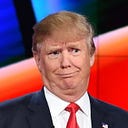Day 1,449: Tacitly acknowledging criminal wrongdoing, Trump examines pardoning himself
A subdued Donald Trump released a video Thursday, a day after mayhem and insurrectionists tried to keep him in power, acknowledging his loss and the transition to the Joe Biden administration.
Behind the scenes, however, he’s preparing for his tradition to a post-presidential life in a very different way: by looking at issuing a controversial and never-before-tested self-pardon.
In several conversations since Election Day, Mr. Trump has told advisers that he is considering giving himself a pardon and, in other instances, asked whether he should and what the effect would be on him legally and politically, according to the two people. It was not clear whether he had broached the topic since he incited his supporters on Wednesday to march on the Capitol, where some stormed the building in a mob attack.
Mr. Trump has shown signs that his level of interest in pardoning himself goes beyond idle musings. He has long maintained he has the power to pardon himself, and his polling of aides’ views is typically a sign that he is preparing to follow through on his aims. He has also become increasingly convinced that his perceived enemies will use the levers of law enforcement to target him after he leaves office.
No president has pardoned himself, so the legitimacy of prospective self-clemency has never been tested in the justice system, and legal scholars are divided about whether the courts would recognize it. But they agree a presidential self-pardon could create a dangerous new precedent for presidents to unilaterally declare they are above the law and to insulate themselves from being held accountable for any crimes they committed in office.
A pardon, by definition, is something given to someone else. However, Trump is so fearful of being held criminally liable for his conduct in office — including some of the obstruction of justice comments in Robert Mueller’s report — that he’s considering forgiving himself on behalf of the federal government.
It’s something that he has considered as an option for years.
But it’s also a tacit admission that Trump knows he’s engaged in some criminal activity. But such action, even if courts upheld it, wouldn’t shield him from state crimes. That’s notable as New York is examining Trump with an increasingly-large magnifying glass.
Trump is out in less than two weeks. He has known it, he is just now acknowledging it publicly. His main goal is to protect himself and his family members from the repercussions of illegal activity that they have engaged in for the past four (or more) years.
1,449 days in, 13 to go
Follow us on Twitter at @TrumpTimer
